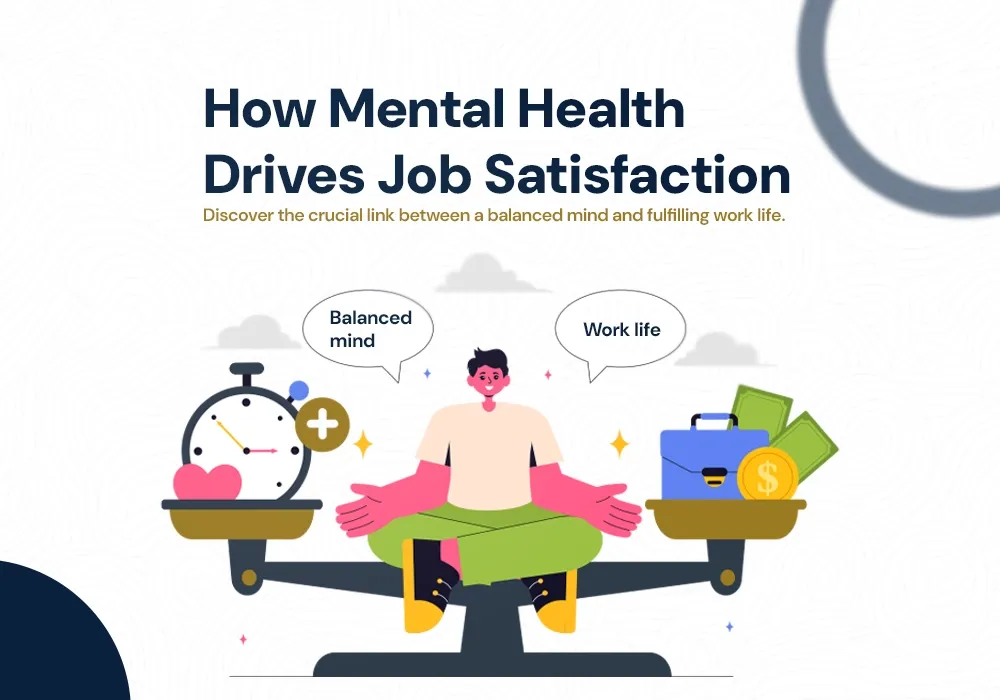
Introduction
Work satisfaction and mental health are closely related. When employees are satisfied with their occupations, they tend to experience improved mental wellness.
On the other hand, low mental health can negatively impact job satisfaction, which can set off a vicious cycle of stress, discontent, and declining mental health.
A lot of study indicated that employees who feel valued and appreciated are more likely to report improved mental wellness, higher levels of engagement, and greater overall job satisfaction.
In this two-way link, improving one can result in improvements in the other.
How Job Satisfaction Helps the Employees Mental Health
The Link Between Creative Problem-Solving and Job Happiness>
Studies repeatedly demonstrate that creative problem-solving and higher-quality work are correlated with job happiness. Employees who are happy in their roles are more likely to approach challenges with innovation and produce superior work outcomes.
Job Fulfillment as a Catalyst for Motivation and Productivity
Having a fulfilling job frequently boosts motivation and output. Fulfilled workers are more inclined to take the initiative and make valuable contributions to their teams, enhancing overall productivity and driving the organization forward.
Building Strong Workplace Relationships Through Job Satisfaction
A happy worker is more likely to cultivate a good rapport with managers and other staff members. These relationships form a network of support that can offer emotional and professional assistance during challenging times, creating a more cohesive and supportive workplace.
Positive Effects of Job Satisfaction on Physical Health
There are noticeable advantages to job satisfaction for physical health. Employees with high job satisfaction levels reported fewer cases of back discomfort, lower absenteeism, and reduced rates of cardiovascular disease, as noted in a study published in the Journal of Occupational Health Psychology
The Consequences of Job Dissatisfaction
Emotional Fatigue from Prolonged Dissatisfaction
Constant dissatisfaction at work can lead to emotional exhaustion. Over time, this emotional tiredness makes it increasingly difficult to stay engaged and motivated in your daily tasks, ultimately affecting your overall well-being.
Impact of Depression and Anxiety on Personal and Professional Life
Depression and anxiety disorders not only affect your mental health but also interfere with both your personal and professional lives. Long-term discontent at work can worsen these conditions, making it harder to cope with day-to-day responsibilities.
Physical Symptoms of Job-Related Anxiety
Anxiety caused by an unhealthy work environment can manifest in physical ways, such as frequent headaches, digestive issues, or even heart problems. The toll on your physical health can be as serious as the mental strain caused by workplace stress.
Damage to Self-Esteem and Self-Worth
Being stuck in a job you dislike can harm your self-esteem. When your daily work doesn’t align with your values or passions, you may begin to feel unappreciated and question your worth. This can lead to a negative self-image and a diminished sense of purpose, further impacting your mental health.
Strain on Relationships Due to Job Dissatisfaction
Job dissatisfaction doesn’t just affect you—it can also negatively impact your relationships with loved ones. The stress and negativity from work can spill over into your personal life, creating emotional burdens that strain your connections with family and friends.
Strategies for Enhancing Job Satisfaction
Fostering Open Communication in the Workplace
Creating a culture where employees feel comfortable expressing their needs and concerns can greatly improve their overall satisfaction. Open communication encourages a more supportive and understanding work environment.
Promoting Work-Life Balance with Flexible Work Options
Employers can help employees achieve a healthier work-life balance by offering flexible schedules and remote working opportunities. These options provide greater control over personal and professional responsibilities, reducing burnout and stress.
The Power of Recognition in Boosting Morale
Regularly acknowledging and rewarding employee contributions creates a sense of belonging and boosts morale. Consistent recognition significantly enhances job satisfaction, leading to a more motivated workforce.
Motivating Employees with Opportunities for Growth
Offering skill development and career growth opportunities demonstrates that the organization values its employees' future. This not only motivates workers but also helps retain talent by showing a commitment to their personal and professional development.
The Link Between Job Satisfaction and Positive Self-Image
A job that aligns with your values and passions reinforces a positive self-image. Engaging in meaningful work boosts confidence, cultivates a sense of accomplishment, and enhances your overall well-being.
Importance of Finding Satisfaction in Our Work
A sense of fulfillment and development in ourselves depends on finding contentment in our work. We are more likely to have a sense of purpose and accomplishment when we are happy in our professions. This sense of fulfillment can lead to better levels of engagement and production, benefiting both the individual and the company.
Addressing your dissatisfaction at work is a smart idea if you're experiencing it. ask for help from coworkers, talk to a supervisor about your problems, look for new opportunities, and Making mental health a priority is essential.
Conclusion
In conclusion, the intricate relationship between job satisfaction and mental health is undeniable. When we find fulfillment in our work, it positively influences our mental well-being, creativity, and productivity.
Improving job satisfaction requires a proactive approach, including open communication, work-life balance, recognition, and opportunities for personal growth.
By aligning our jobs with our passions and values, we can boost our self-esteem and overall mental health, creating a more positive and productive work environment.
Ultimately, addressing dissatisfaction early and prioritizing mental health will not only benefit individuals but also contribute to a healthier, more engaged workforce.

Agan Health is a psychological wellness and mental healthcare centre functioning to help children, adults, women, and the elderly suffering from psychological conditions like anxiety, depression, stress, ADHD and others to break their mental shackles and reinstate them into society.
Counselling
Contact Us
For appointment and consultation:
Bengaluru
BDA complex, 717/1, 16th Main, 6th B Cross Rd, above Child Central Clinic, 3rd Block, Koramangala, Bengaluru, Karnataka 560034
Trichy
#9-A, EVR Road, Aruna Nagar, Puthur, Tiruchirappalli, Tamil Nadu 620017
